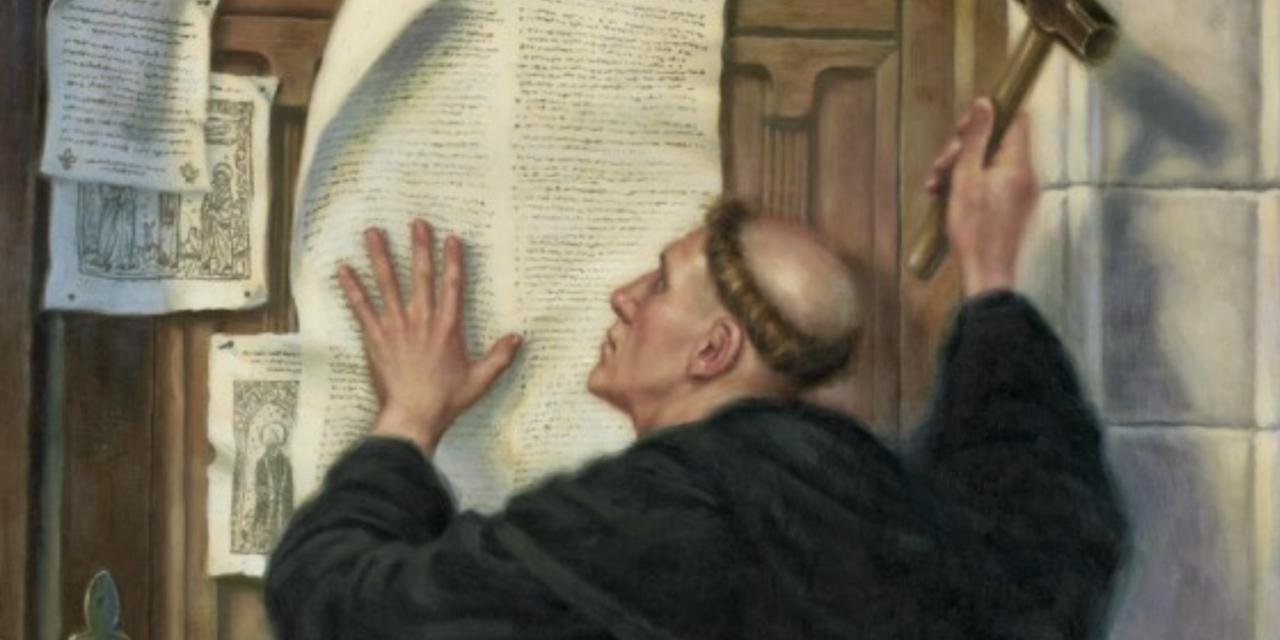Amid all the pumpkins and other Halloween-themed decorations, you’re unlikely to see any Reformation Day displays this coming Monday, October 31st.
To be fair, many churches will be acknowledging on Sunday the 505th anniversary of Martin Luther nailing the 95 theses to the door of Castle Church in Wittenberg, Germany. But in the arc of the Church calendar, is there any other day more significant that receives so little attention by so many Christian believers?
For Protestant followers of Christ, it would be difficult to overstate how revolutionary Martin Luther’s declaration was – and how transformative his bold move proved to be across the globe for the past five centuries.
Just 33-years-old and a Catholic priest for ten years, Martin Luther was teaching theology at Wittenberg University in 1517. Over time, he had grown frustrated with abuses within the Church, such as the selling of indulgences, and a growing belief that one could somehow buy or earn their eternal salvation. There is evidence he spoke up frequently and publicly about it, but until that fateful Saturday in October, his objections were either ignored or dismissed.
It’s ironic, however, that the person responsible for the volcanic eruption that transpired didn’t set out to split apart anything. From his perspective, Martin Luther didn’t leave the Catholic Church – the Catholic Church left him. He wanted to reform it – not divide it.
Even the late Pope John Paul II, who shepherded the Catholic Church for 36 years between 1979 and 2005, would go on to praise Luther as someone who ”contributed in a substantial way to the radical change in the ecclesiastical and secular reality in the West. Our world still experiences his great impact on history.”
In some churches, Reformation Day celebrations are often marked by pomp and pageantry, including the playing of bagpipes and the singing of Luther’s great hymn, “A Mighty Fortress.” Incidentally, the bagpipes are a nod to the Scottish reformer John Knox, who rode Luther’s momentum and is credited with starting the Reformed Tradition.
But beyond the mere acknowledgement of such a momentous anniversary, we might also see Reformation Sunday as a day to remember that Christian believers should remain ever vigilant when it comes to maintaining our fidelity and commitment to God’s Word and His teachings. Heresy cannot be entertained or tolerated.
Trevin Wax, vice president with the North American Mission Board, notes in his new book, “The Thrill of Orthodoxy: Rediscovering the Adventure of Christian Faith,” that, “Fundamental doctrines of the Christian faith are more than just a backpack on the journey, something optional to carry along with us in case we need them. Instead, they’re more like the map that makes clear our destination, warns us away from dead-ends, and orients us to the landscape, helping us interpret our current moment and walk forward as faithful sojourners.”
Given our increasingly pluralistic culture, some Christians unwittingly fall prey to going along to get along – a tactic that almost always ends poorly when it comes to upholding God’s truth.
Dr. David Martyn Lloyd-Jones, who served London’s Westminster Chapel for nearly thirty years as pastor, was once challenged about our need to be both charitable and tolerant toward those who don’t subscribe to an orthodox reading of Scripture.
“Christ Himself said, ‘I am the way, the truth and the life, no man cometh unto the Father, but by me’ (John 14:6). He says all others have been thieves and robbers. So when I find the thieves and robbers being accepted into the Church and their views being tolerated and praised, surely I am bound to protest.”
Like Martin Luther, we must protest heretical teaching. Whether it’s lies about the authority of God’s Word, life, marriage, the foundational truth about the exclusivity of male and female or the suggestion that government, not parents, is ultimately responsible for their children – we must object. Lies destroy.
Luther’s famous hymn, “A Mighty Fortress,” based on Psalm 46, and written 493 years ago, remains a timeless masterpiece that still speaks and inspires as we navigate the heretics and heresies of today:
And though this world, with devils filled, should threaten to undo us, we will not fear, for God has willed His truth to triumph through us. The prince of darkness grim, we tremble not for him; his rage we can endure, for lo! his doom is sure; one little word shall fell him.
Happy Reformation Day.






